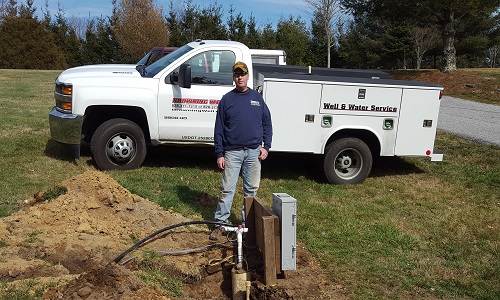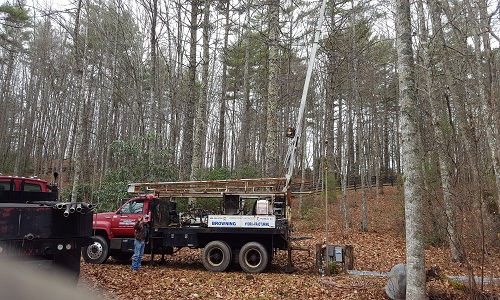This story was written by Rachel Plouse, originally published in The Crossroads Chronicle on April, 12th 2017.

Chris Browning, co-owner of Browning Well in Cashiers, NC. Photo provided by Jordan Parker.
Well maintenance is usually the last thing on our minds while we’re improving our homes. It’s not until a catastrophe happens that we remember the wear and tear both weather and nature have on our wells.
When you live outside of a large city, it’s common to find yourself, the owner, or shared owner, of a water well. If you are new to the area or have never done any type of well maintenance before, the task can seem daunting. But it’s not that difficult once you learn the basics.
“People forget to test their wells,” said Jordan Parker, Lead Technician at Brownings Well Drilling in Cashiers. “Bacteria and other things can build up and cause the water to be contaminated.”
The National Ground Water Association recommends that well owners test the water annually to try to prevent or catch bacteria. Bacteria that can grow in wells includes coliform, E.coli and nitrate. Other times owners should test well water is if they notice a change in taste, smell, or color as well as if multiple family members or houseguests have recurring incidents of gastrointestinal illness.
Another way to make sure your water stays clean is to keep hazardous chemicals, motor oil, paint, pesticides and fertilizer, away from the well. Also, make sure to maintain separation between the well, buildings, and waste systems.
When landscaping, make sure to keep the top of your well at least one foot above the ground then slope the ground away from the well to allow for proper drainage. Don’t allow anything to settle on top of the well, including snow and leaves.
The most important thing that all well owners must do is to be aware and observant.
“Sometimes rats will get in there and chew on the insulation,” said Dennis Holland, owner of Holland Well Drilling in Franklin. “Owners won’t realize it until their water freezes in the winter.”
According to Holland, the best practice is to remove the insulation during the summer and to replace it in the winter.
“I like to make sure my well is insulated and have a light in there to keep the water from freezing,” said Glenn Rawls, a part-time Cashiers resident.

LC Browning, co-owner of Browning Well, drilling a new well. Photo provided by Jordan Parker.
The mountain climate also influences wells. Because of the small area, citizens are forced to deal with natural disasters such as drought. Last year many counties in Western North Carolina were in a severe drought. Droughts have an impact on wells as it causes some of the water to dry up. During the worst droughts when there isn’t enough rain to refill the groundwater, even the deep 800-foot wells in WNC can face problems.
Even though it might seem easy just to leave your well alone, you can never be too careful. Be sure to check your well cover and look inside every few months just to make sure there haven’t been changes.
Rawls said that even though his well is in good shape, he still likes to keep an eye on it.
There are always some problems that homeowners just can’t fix on their own such as fixing a pressure tank. If a pressure tank has malfunctioned, it will usually require a licensed well professional to repair it. Attempting to do work you’re not qualified to do will sometimes do more harm than good.
To find more information on well water regulations and where to get water testing kits, contact the National Ground Water Association at ngwa.org.


